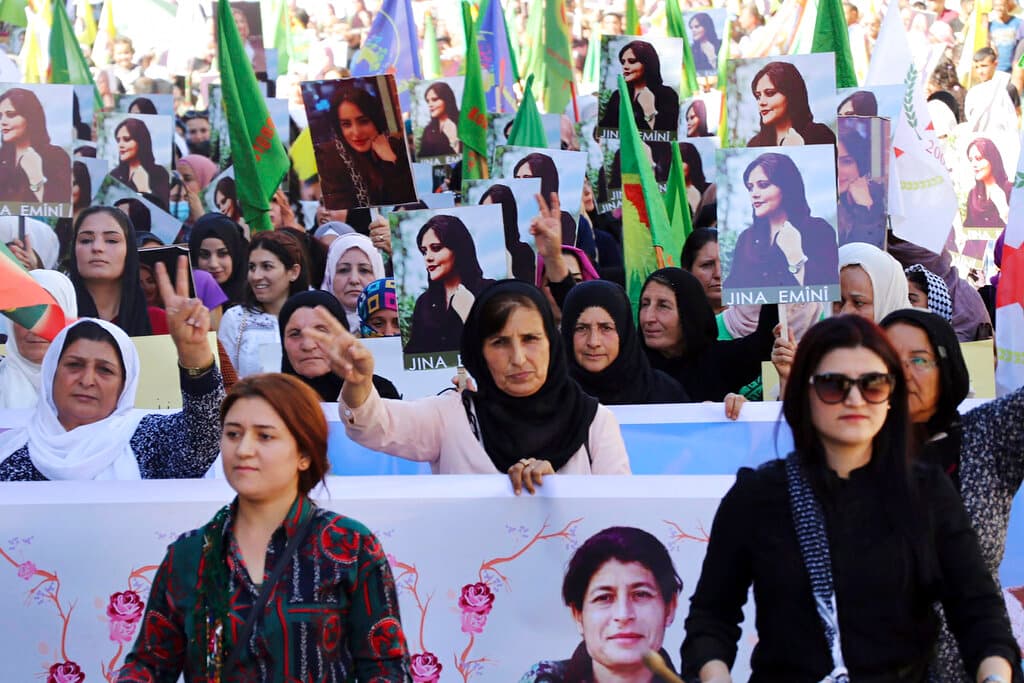Tehran Tries To Scapegoat Kurds for Widening Rebellion
The Islamic Revolutionary Guards Corps is turning its ire on the region’s perennially oppressed minority as the regime blames outside instigators for the unrest.

Unable to quell a revolution sparked by the killing of a 22-year old Kurdish-Iranian woman for violating Hijab rules, Tehran is attacking Kurds at home and in neighboring Iraq.
As Iran’s “hair revolution” intensifies, with ever-bloodier clashes taking place across the country, the Islamic Revolutionary Guards Corps is turning its ire on the region’s perennially oppressed minority — the Kurds.
The ongoing uprising in Iran, the largest so far against the Islamic Republic’s rule, ensued after young Mahsa Amini traveled to Tehran from her Kurdish hometown, Saqqez. Her now-infamous arrest, and her September 16 death at the hands of her morality police captors, angered her fellow Iranian-Kurds, who started clashing with authorities.
After starting in the Kurdish areas, the protest quickly widened to the rest of the country, and currently encompasses at least 46 Iranian cities. Iranians of all stripes cite the killing of a young woman for failing to comply with ill-defined and unjust dress codes for females as a symbol of the regime’s rigidity and cruelty. Unlike past unrest, protesters are explicitly calling for the toppling of the Islamic Republic.
As the IRGC joins police and Basij militias in counter attacks against the rebels, the death toll among protesters and police has reached 41, according to the latest reports from state-run television. The real numbers are likely much higher. The Iranian authorities, as is their wont, are blaming outside instigators for the unrest. They increasingly are singling out the Kurds as the supposed catalysts.
The IRGC has long targeted the Iraqi-Kurdish autonomous areas on various pretexts, including allegations that it serves as a hub for the Israeli Mossad. On Saturday and yesterday, attacks on Iraqi Kurdistan resumed with missiles and drones.
The shelling was in “response to the evil support of the anti-revolutionary elements for the disturbances and actions of thugs and with the aim of punishing and extorting these groups,” a report on the IRGC-affiliated Fars News contended.
There were no casualties, but villagers were irate. Bombs “were falling like rain right near our houses,” a villager in the Barbazin area, Ahmed Saeed, told the Erbil-based Rudaw television.
Two anti-regime Kurdish-Iranian groups, Komala and the Kurdistan Democratic Party of Iran, are based in the Iraqi Kurdish area. Tehran seems intent on pinning the unrest on those groups. “It reinforces the regime’s narrative that the protest is foreign-controlled,” a senior researcher at United Against Nuclear Iran, Jason Brodsky, tells the Sun.
The idea, he adds, is “to distract and deflect” from the nationwide anti-regime uprising. Yet, he adds, “the protesters see right through it.”
The idea that outsiders instigate, finance, and control the unrest, then, may be honed for the ears of regime supporters, rather than its opponents. The regime’s biggest fear is that its enforcers would start defecting and side with the rebels.
It may also be directed at foreigners, who are often concerned about seeming too enthusiastic in their support of regime change in foereign lands. “Since the regime portrays opposition as the work of outsiders or their stooges, grand statements from Western leaders — especially those immiserating Iran — are not always helpful,” a British left-wing newspaper, the Guardian, writes in an editorial.
Activists, however, favor full-throated American and Western support for their cause. President George H.W. Bush’s call in 1991 for Iraqis to rise up against Saddam Hussein has long been criticized for America’s failure to follow up with material support for the rebels. Yet, Iraqi Kurds remember it as the beginning of what later was established as their autonomous zone.
Iranians have been encouraged by one of President Biden’s throwaway lines in his speech at the United Nations last week. “Today we stand with the brave citizens and the brave women of Iran who right now are demonstrating to secure their basic rights,” Mr. Biden told the General Assembly.
Yet, many are saying that a follow-up is much needed. Measures announced at Washington over the weekend to help bypass Tehran’s internet restrictions have failed so far to ease communication snags experienced by protesters. The regime’s enforcers have cut off cellphone messaging, which is how the rebels mostly communicate.
As thousands of Iranians are arrested, shot, and violently dispersed, regime officials are quietly assuring regional allies in Iraq, Syria, Lebanon, Yemen, and beyond that they have the situation well in hand, several sources have told the Sun.
Yet, Iran watchers increasingly say that even if the current wave of unrest is suppressed, the revolt would soon return. As UANI’s Mr. Brodsky puts it, far beyond localized Kurdish unrest, the regime’s problem is that “they preside over a population that wants them gone.”

